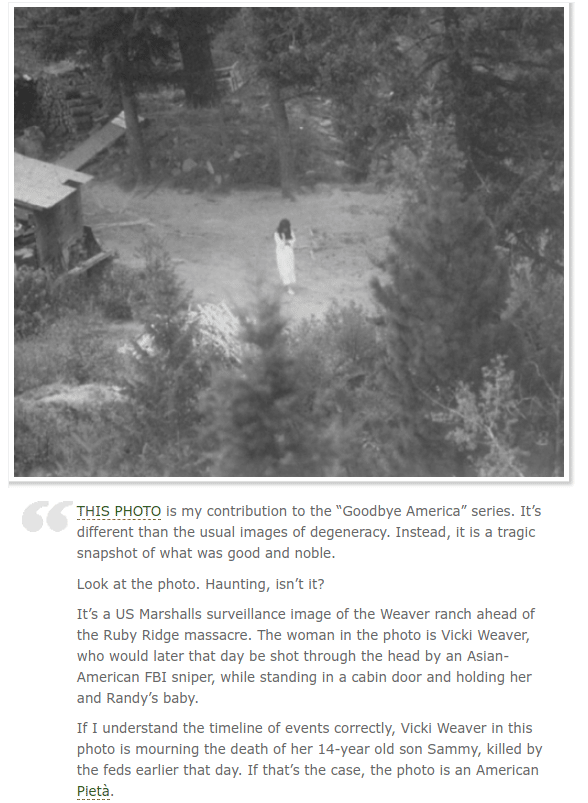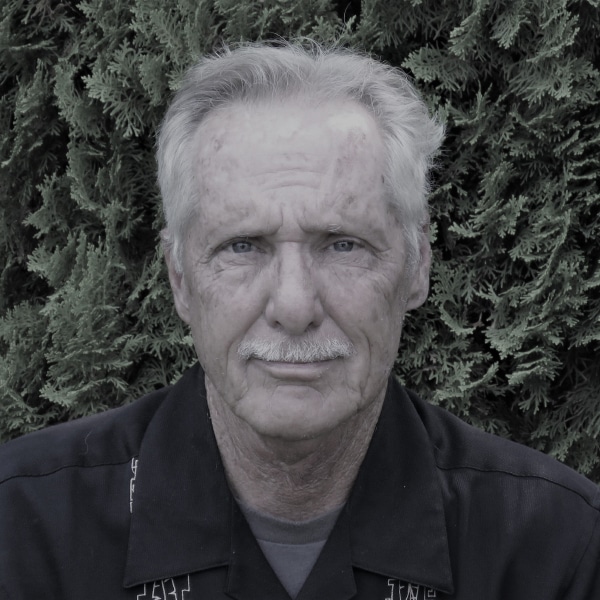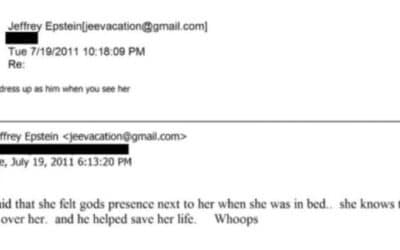“The American people look forward to learning the truth of the Randy Weaver case. Unfortunately, that truth will have to come from someplace other than the Federal Bureau of Investigation.” Jim Bovard responds to Louis Freeh, FBI Director (see Jim’s full response below)
The Wall Street Journal
Monday, February 27, 1995
Letters to the Editor: The FBI Should Face the Facts
Federal Bureau of Investigation Director Louis Freeh, in his Jan. 26 Letter to the Editor, denies the allegations from my Jan. 10 editorial-page article that the FBI has engaged in a coverup regarding its actions at Ruby Ridge, Idaho, in 1992. Unfortunately, Mr. Freeh’s comments indicate that his agency is not yet willing to face the facts.
Regarding the shooting of the U.S. marshal, Mr. Freeh asserts that “the deputy marshals did not try to provoke a confrontation; their intent was to retreat from the area without violence and they attempted to do so.” This is the same explanation that U.S. marshals on the witness stand first offered to the Idaho jury. After hours of cross-examination, a U.S. marshal admitted that the conflict began when a marshal shot and killed one of the Weaver’s dogs. Most American dog-owners would consider the shooting of their dog a provocation. And this is a peculiar way to “retreat from the area without violence.” Mr. Freeh does not even attempt to refute the fact that a U.S. marshal shot 14-year-old Sammy Weaver in the back as the boy was running away from the scene of the clash with the marshals.
Regarding the FBI sniper Lon Horiuchi’s killing of Vicki Weaver, Mr. Freeh asserts that the death was accidental and that “the FBI sniper was firing at a person he reasonably believed had, only seconds before, threatened to shoot at a helicopter carrying fellow law-enforcement officers.” The only thing that the FBI’s “helicopter rationale” for the shooting of Randy Weaver lacks is a helicopter. This was the same argument federal prosecutors made at trial in Idaho and it was thrown out of court by the federal judge. Other federal officials testified at the trial that no helicopters were flying in the vicinity of the Weavers’ cabin at the time of the FBI sniping. Chuck Peterson, an Idaho lawyer who was part of Mr. Weaver’s defense team, observed, “The Federal judge threw out the [federal charge that Weaver aimed at] the helicopter because it was so incredibly weak — it was not supported by anything.”
Mr. Freeh then states that the shot that killed Vicki Weaver “was fired to prevent the armed subject from gaining the protective cover of the cabin from which it was believed that he and others could fire upon the law-enforcement officers on the scene.” But Randy Weaver had never fired upon the FBI agents — he was merely a wounded man trying to struggle into his home and the arms of his family. Mr. Freeh’s doctrine essentially means that if a government agent shoots and wounds a private citizen, then the government agent must be presumed to have a right to kill the private citizen — because otherwise the citizen might shoot back at the government agent.
This is a peculiar guide for law enforcement in a free society, for a society in which lawmen are not supposed to be able to wantonly shoot private citizens based on mere suspicion.
Mr. Freeh mentions, regarding the shot that killed Vicki Weaver, that the shot “wounded its intended target and . . . also accidentally struck and killed Vicki Weaver. . . .” Mr. Freeh’s letter implies that the “intended target” was Randy Weaver; however, the sniper at trial claimed that he was shooting at Kevin Harris, a family friend staying in the cabin, who was near the door and was not even accused of aiming at the helicopter. Apparently, since he was in the vicinity of Randy Weaver, that was sufficient for the FBI to attempt to kill him. Mr. Freeh’s wording implies that the bullet first hit the “intended target” and then hit Vicki Weaver. However, the bullet first passed through Vicki Weaver’s head before hitting Kevin Harris. The sniper’s testimony at trial indicated that he may have thought that Vicki Weaver was actually Kevin Harris — but that is a lame excuse for shooting a mother who posed no threat to the federal agents.
Mr. Freeh seeks to justify the shot that killed Vicki Weaver by stating that she was standing (while holding her 10-month old baby) “unseen behind the outwardly opened door.” He claims that the shot was an accident, which others who have examined the case or were involved in the surrender negotiations deny. But what sort of hostage rescue team takes deadly shots by an open door of a single-room cabin occupied by a woman and children?
Mr. Freeh declares, “I support the public’s right to know about the workings of its government and the integral role the press plays in ensuring an informed public.” This is a fine sentence for a letter to the editor, but it is ironic that it comes just after a sentence in which Mr. Freeh invokes a confidential 542-page Justice Department report that he claims vindicates his agency. Why is the Justice Department refusing to allow the public access to its own review of the case? This confidential document reportedly concludes that the FBI rules of engagement “contravened the Constitution of the United States.”
In a case in which three people were shot dead, Mr. Freeh says he has taken “all necessary remedial actions” — i.e., “I publicly announced that FBI employees had exhibited errors of judgment, neglect of duty, inadequate performance and failure to exert proper managerial oversight. . . .” If this case was about how some city policeman’s negligence resulted in a major traffic jam, then Mr. Freeh’s action might be appropriate. But this is a case in which a federal judge and an Idaho jury basically found that the U.S. government was lying from top to bottom in the allegations it made in federal court. (The judge commented that 75% of the evidence that the U.S. government had presented at the trial had actually helped the defense.) Is it proper that FBI acting Deputy Director Larry Potts, the person in charge of the operation, received the same “penalty” (a letter of censure in his file) that Mr. Freeh himself received when he lost a cellular telephone?
Mr. Freeh claims there has been no “patchwork of deception” at the FBI regarding this case. But even the press statement issued on the day that Mr. Freeh announced the wrist-slaps on his subordinates contained false information. The FBI claimed that Mr. Weaver had been convicted of the original weapons violations charge. Actually, an Idaho jury ruled that Mr. Weaver had been illegally entrapped and instead convicted him only of failing to show up for the trial in 1991. The FBI claims to have been studying the Weaver case for more than two years — but still cannot even get the basic facts straight.
The American people look forward to learning the truth of the Randy Weaver case. Unfortunately, that truth will have to come from someplace other than the Federal Bureau of Investigation.
James Bovard
Washington
Jim Bovard articles on The Ruby Ridge killing
































